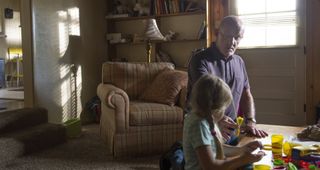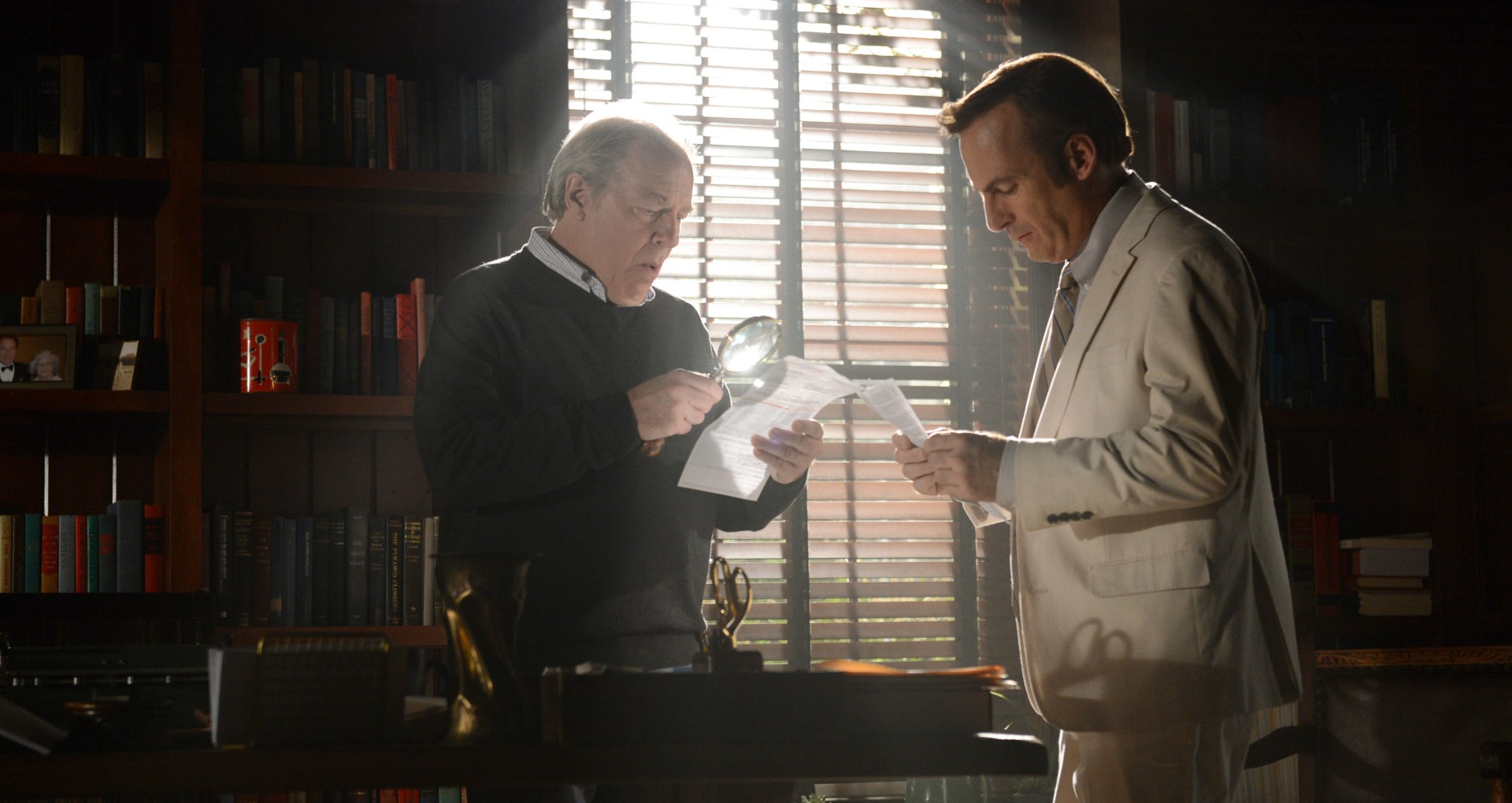Why you can trust GamesRadar+
Much like the first episode of the series, it’s the cliffhanger ending that really makes this instalment. There’s a great progression to it, as you slowly realise that, wait, Chuck is walking towards the door, he’s going outside, he’s showing no sign of any ill effects… and he’s so absorbed in helping Jimmy with a case that he hasn’t even realised what he’s done. What a kicker! It’s like seeing a wheelchair user casually stand up and go for a stroll.
Setting that aside for a moment, this is a very solid episode that demonstrates many of Better Call Saul’s better qualities. Once again, we see that Jimmy has a good heart: he feels uncomfortable taking money from old folks who can’t afford it, and his investigation into the exploitative Sandpiper Crossing residential home seems driven more by concern than a desire to land a juicy class action. The guy is likeable and considerate, which is tragic given how his future career pans out.
Bob Odenkirk again gets to show his aptitude for physical comedy, as he thrashes about in a dumpster searching for shredded documents with lettuce hanging off the side of his face, bashing his head on the lid. The moment where a garbage-covered Jimmy spots a paper recycling bin only yards away is delightfully timed.


The jazzy instrumental heard while Jimmy reassembles the care home’s shredded invoices is “Coffee Cold”, a 1966 track by Galt MacDermot. If it sounds familiar but you can’t place it, it might be because it featured in the soundtrack for The Thomas Crown Affair, or because it’s been sampled by numerous hiphop artists.
It’s also a particular pleasure for Breaking Bad fans to have further bits of Jimmy and Mike’s backstory fleshed out. It’s a surprise to discover that Jimmy once worked in HH&M’s post room, and charming to see the day the letter arrives telling him he’s now a qualified lawyer. (One can’t help being a little suspicious about that degree from the University Of American Samoa, though… did Jimmy really quietly study for years without telling anyone in order to pass the bar, or did he simply write a big enough cheque?) We are given further explanation why Jimmy’s resentment against Howard Hamlin has such depth, as we see (but don’t hear) Hamlin breaking the news that they don’t intend to promote him – a neat trick, that, which worked really well previously when Mike was spying on the Kettlemans. And finally, it’s explained why Mike got involved in criminality: to provide for his dead son’s family. True, any Breaking Bad fan could probably join the dots there, given that Mike repeatedly tried to ensure that granddaughter Kaylee received his ill-gotten gains, but it’s good to have it spelt out.
Back to that gasp-inducing ending then. Where will it take us next? Is Chuck cured? Unlikely, though it will surely lead him to accept – eventually – that his “sensitivity to electromagnetism” is all in the mind. Better Call Saul centres on a struggling lawyer, not a struggling lawyer with a high-powered legal eagle brother; Chuck kinda has to stay ill. For similar reasons, no matter how well-founded Chuck and Jimmy’s case is, it seems certain that it will hit a brick wall within a couple of episodes. This isn’t a show about courtroom drama. Still… it should be fascinating to find out how this all plays out.
Cert Uncertainty
We knew from Breaking Bad that Saul has a qualification from the (fictional) University Of American Samoa – Skylar saw a certificate on his office wall (in season three’s “Abiquiu”). But that was dated 23 May 1984, and was for an MA in Political Science. Even more confusingly, it was in the name of Saul Goodman. Maybe he just faked it later?
The Sound Of Silence
Writer Gordon Smith says that the unheard speech Howard delivers to Jimmy (which was fully scripted and memorised by the actor) went something like this: “We don’t have any associate positions open right now, and my hands are tied. I wish we could help you. It’s really great that you’ve done this, but it’s not going to happen right now.”
Tick Tock Talk
Quite who first coined the phrase, “even a stopped clock is right twice a day” is unknown, but maybe Jimmy picked it up from listening to Jay-Z, watching Withnail And I or The Sopranos or, er, 1982 Doctor Who story “The Visitation”. Probably not the last one. Someone really needs to do a YouTube supercut here…
| Writer | Gordon Smith |
|---|---|
| Director | Colin Bucksey |
| The One Where | Jimmy takes on a care home thats exploiting its residents by over-charging them. |
Ian Berriman has been working for SFX – the world's leading sci-fi, fantasy and horror magazine – since March 2002. He's also a regular writer for Electronic Sound. Other publications he's contributed to include Total Film, When Saturday Comes, Retro Pop, Horrorville, and What DVD. A life-long Doctor Who fan, he's also a supporter of Hull City, and live-tweets along to BBC Four's Top Of The Pops repeats from his @TOTPFacts account.

